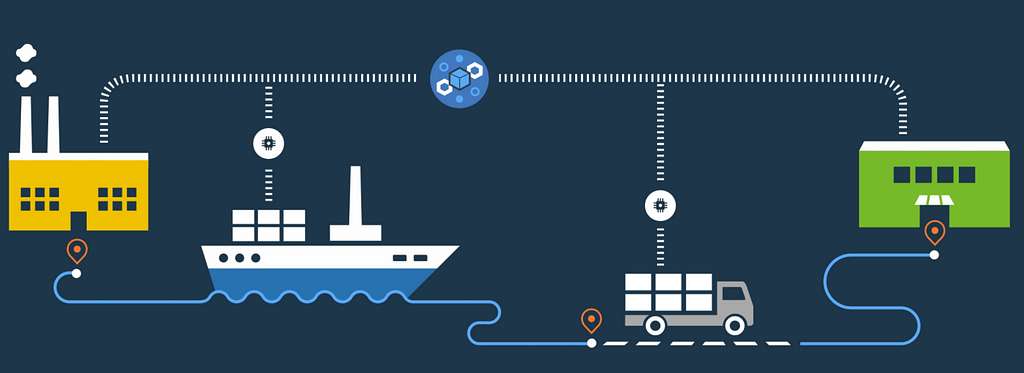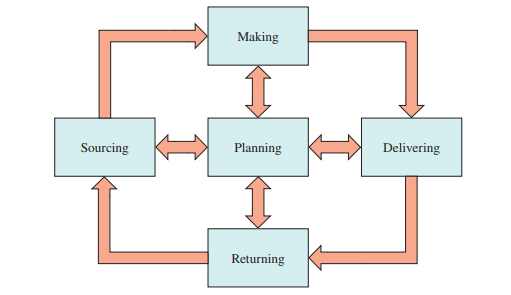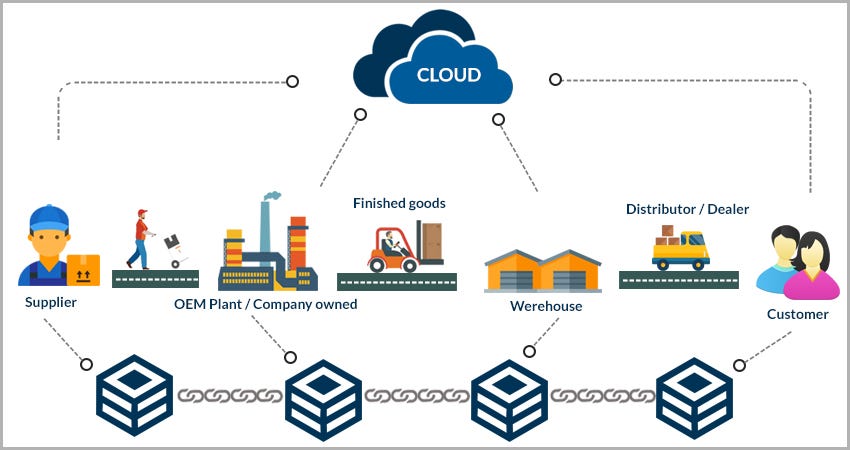Latest news about Bitcoin and all cryptocurrencies. Your daily crypto news habit.

Hello & welcome all of my friends to my new article, “How Blockchain Will Enrich the Supply Chain Management”! In this article, I will discuss the supply chain processes, advantages of using blockchain technology in supply chain management, an example of a real platform that uses blockchain to do supply chain management, a combination of blockchain, cloud computing & big data to build better Enterprise Resource planning (ERP) Systems for supply chain management.
As in commerce, the term “Supply Chain Management” refers to processes that move information and material to & from the manufacturing & service process of the firm. In simple words, it is the management of the flow of goods & services. The main difference between services and goods is that a service is an intangible process that cannot be weighed or measured, whereas a good is a tangible output of a process that has physical dimensions. The other difference is that a service requires some degree of interaction with the customer for it to be a service. Goods, on the other hand, are generally produced in a facility separate from the customer.
Supply chain management processes
Supply chain management processes can be categorized into five different sections.
- Planning: consists of the processes needed to operate an existing supply chain strategically. Here a firm must determine how anticipated demand will be met with available resources. A major aspect of planning is developing a set of metrics to monitor the supply chain.
- Sourcing: involves the selection of suppliers that will deliver the goods & services needed to create the firm’s product. A set of pricing, delivery, and payment processes are needed, along with metrics for monitoring and improving the relationships between partners of the firm. These processes include receiving shipment, verifying them, transferring them to manufacturing facilities, and authorizing supplier payments.
- Making: is where the major product is produced or the service provided. The step requires scheduling processes for workers and the coordination of material and other critical resources such as equipment to support producing or providing the service. Metrics that measure speed, quality, and worker productivity are used to monitor these processes.
- Delivering: is also referred to as logistics processes. Carriers are picked to move products to warehouses and customers, coordinate and schedule the movement of goods and information through the supply network, develop and operate a network of warehouses, and run the information systems that manage the receipt of orders from customers and the invoicing systems that collect payments from customers.
- Returning: involves processes for receiving worn-out, defective, and excess products back from customers and support for customers who have problems with delivered products. In the case of services, this may involve all types of follow-up activities required for after-sales support.
Advantages of using blockchain technology in supply chain management
Blockchain is a revolutionary digital technology. Its features will help supply chain companies to do day-to-day operation easily & effectively. Transparency in the blockchain is the ability to track all transaction performed by users. If you use blockchain in supply chain management, all transactional data from the warehouse to the delivery point can be recorded in blocks, a list of records which are linked using cryptography. Due to the transparency nature, anyone can audit all transactions if any problem occurs in the future.
Decentralization helps supply chain companies to operate tasks with no central authorities involved. It also reduces human errors as there are no humans involved. It automates the purchasing & planning processes.
The blockchain also helps to organise the supply chain data effectively. It is the feature of Better Data Management. Data comes from products & services. In today's companies, there seems to have a large torrent of data. It is not easy to handle these Big Data. The blockchain will give a solution to that problem.
Volum — An example of a real platform that uses blockchain to do supply chain management
The Volum, developed by Volum company, is a platform that helps supply chain companies to do day-to-day operations. This platform uses a common native currency with blockchain technology to track all processes & to reduce management & infrastructure costs. It uses B2B (business-to-business) marketplace transactions powered by smart contracts. B2B is a series of events, phases, or steps which involve when one business sells a product or service to another business rather than to consumers.
Future trends — A combination of blockchain, cloud computing & big data to build better Enterprise Resource Planning (ERP) Systems
Cloud Computing is one of the ways in which computing has now become something that we can do anytime & anywhere. Cloud Storage provides space in which data or information is stored on remote databases, instead of storing information to computers’ hard drives. The internet provides a connection between computers & databases. Big Data refers to a large set of data which cannot be handled using typical computing technologies.
Now companies can make all of their data available through simple apps. Every employee, no matter where they are located, can set up an instant office with a simple and secure wireless connection. New applications are instantly deployed globally to all employees when they are ready. All employees are looking at the same data, using the same application software, and reacting to the same real-time information. So, companies have Enterprise Resource Planning (ERP) Systems which are running on “the cloud”. An ERP system is a computer system that integrates application programs in accounting, sales, manufacturing, and the other functions in a firm. This integration is accomplished through a database shared by all the application programs.
In addition to the transparency provided by the blockchain, with ERP systems running on the cloud, transactions are processed in real time, meaning that as soon as a transaction is entered, the effect is known by all users of the system. So, the combining effect of blockchain, cloud computing & big data in supply chain management comes into play!
How Blockchain Will Enrich the Supply Chain Management was originally published in Hacker Noon on Medium, where people are continuing the conversation by highlighting and responding to this story.
Disclaimer
The views and opinions expressed in this article are solely those of the authors and do not reflect the views of Bitcoin Insider. Every investment and trading move involves risk - this is especially true for cryptocurrencies given their volatility. We strongly advise our readers to conduct their own research when making a decision.

